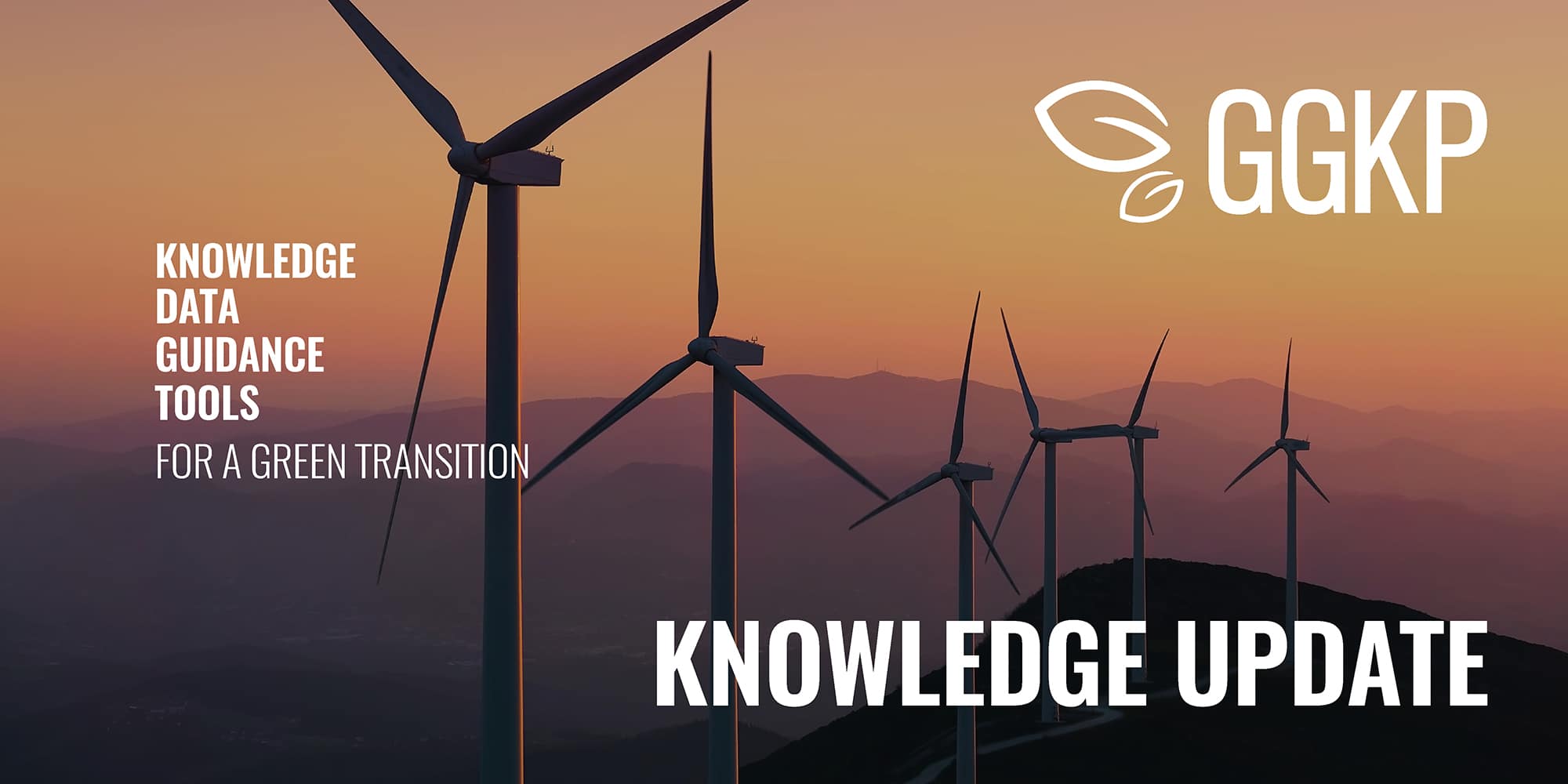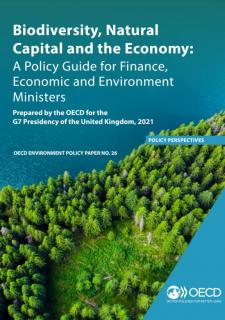New GGKP Working Group on Sustainable Finance Policy Effectiveness
The Green Finance Platform, International Network for Sustainable Financial Policy Insights, Research, and Exchange (INSPIRE) and Grantham Research Institute on Climate Change and the Environment have launched a GGKP working group dedicated to sustainable finance policy effectiveness.
“Policymakers are introducing an increasing number of green finance measures. The question is how to make sure that these are as effective as possible in terms of aligning the financial system with sustainable development. Tackling this is what the new working group is all about.” said Nick Robins, Co-Chair of INSPIRE and Professor of Sustainable Finance at the Grantham Research Institute of the London School of Economics.
New from the Green Policy Platform
Biodiversity, natural capital and the economy
A new report from the Organisation for Economic Co-operation and Development (OECD) shows how finance, economic and environment ministries in G7 countries can halt and reverse the loss of biodiversity. Policy guidance is provided for four key areas: measuring and mainstreaming biodiversity; aligning budgetary and fiscal policy with biodiversity; embedding biodiversity in the financial sector; and improving biodiversity outcomes linked to international trade.
Five principles for a fossil-free recovery
A new report from the IISD Global Subsidies Initiative, Achieving a Fossil-Free Recovery, outlines how governments can achieve a fossil-free recovery by following five simple principles: do not provide public money to fossil fuel production; raise money from fossil fuel subsidy reform and taxes; swap support from fossil fuels to clean energy; incentivize investments in clean electricity; and ensure the transition is just.
Environment and trade 2.0
A new report from the IISD Global Subsidies Initiative, Achieving a Fossil-Free Recovery, outlines how governments can achieve a fossil-free recovery by following five simple principles: do not provide public money to fossil fuel production; raise money from fossil fuel subsidy reform and taxes; swap support from fossil fuels to clean energy; incentivize investments in clean electricity; and ensure the transition is just.
#NDCsWeWant in Latin America and the Caribbean
WWF’s #NDCsWeWant Checklist is a tool for benchmarking nationally determined contributions (NDCs) to the Paris Agreement against five areas: ambition in mitigation, adaptation and finance; fostering systemic change; inclusiveness and participation in the NDC design process; contribution to sustainable development; and systems for tracking progress. A new report uses the checklist to assess 15 NDCs in Latin America and the Caribbean ahead of the COP 26.
New from the Green Industry Platform
Redefining value: The manufacturing revolution
A new report from the International Resource Panel (IRP) quantifies the potential impacts of value-retention processes (reuse, repair, refurbishment and remanufacturing) for nine products in four economies (Brazil, China, Germany and the US). The report highlights regulatory, market, technology and infrastructure barriers to scaling up these processes, and key actions for industry members and policymakers to alleviate these barriers.
Net zero by 2050: A roadmap for the global energy sector
In this report, the International Energy Agency (IEA) sets out a roadmap and seven key principles to reach net zero by 2050. It includes more than 400 milestones spanning all sectors and technologies, focusing on what analysis has shown to be the most technically feasible, cost?effective and socially acceptable. It also examines key uncertainties, such as the roles of bioenergy, carbon capture and behavioural changes in reaching net zero.
Circular economy in industrial parks: Technologies for competitiveness
This World Bank report demonstrates how circular economy interventions can improve the competitiveness of industrial parks and tenant firms. It highlights eco-industrial parks technologies, infrastructure investments and business models in three areas: energy, water supply and wastewater treatment technologies, and material and waste heat (industrial symbiosis and other material recovery technologies).
New from the Green Finance Platform
Paris alignment methodologies for banks
A new report from ShareAction provides a set of recommendations for Paris alignment of bank portfolios. The recommendations are based on a review of two major open-source frameworks and one in-house methodology: the Science Based Targets initiative (SBTi), Paris Agreement Capital Transition Assessment (PACTA), and Barclays’ BlueTrack.
A brief for investors: How to spur meaningful dialogue on natural climate solutions
A brief from nonprofit Ceres offers an engagement tool for investors to spur meaningful dialogue with companies on the role and use of natural climate solutions (NCS) in delivering on climate commitments. It focuses on equities and is structured around three main areas: the role of natural climate solutions in corporate climate strategies for achieving net-zero emissions, the quality of nature-based carbon credits, and the need for social and environmental safeguards on NCS initiatives.
Overview and recommendations for sustainable finance taxonomies
The International Capital Market Association (ICMA) has released an overview of sustainable finance taxonomies, including the EU Taxonomy, China’s catalogues, OECD’s “Rio Markers” and the national taxonomies of Malaysia, Bangladesh, Mongolia, Singapore and South Africa. It also covers market-based taxonomies from the Climate Bonds Initiative and the forthcoming International Organization for Standardization (ISO) Green Taxonomy. The report identifies criteria for taxonomies aimed at promoting international consistency and market usability.
New from #GGKPinsights
Our economic blind spot: Valuing natural capital for sustainable growth
“We propose a model that tracks production from source to sink,” says Sir Partha Dasgupta, Frank Ramsay Emeritus Professor of Economics at the University of Cambridge, in a new op-ed. “By valuing the depreciation of assets, we help ensure that nature is no longer a blind spot in the economic accounting systems that decide how we manage our global portfolio of goods and services.”
Plugging the gap: Natural capital financing to meet the SDGs
“Our report is a first step in helping governments, businesses and researchers identify, secure and appropriate financing to projects that will help plug the natural capital-related SDG investment gap,” says Anil Markandya, Distinguished Ikerbasque Professor at the Basque Centre for Climate Change (BC3). “By recognizing the value of nature in investment decisions, we set ourselves up to better address our most important global challenges – from biodiversity loss to human health and poverty, to the threat of runaway climate change.”
Upcoming Virtual Events and Webinars
- 10 June (5pm CEST), WEBINAR: Putting the EU chemicals strategy for sustainability into action: Looking forward, Food Packaging Forum
- 10 June (11am CEST), ONLINE EVENT: Traceability across circular value chains: How to unlock its potential and mitigate challenges?, Centre for European Policy Studies
- 11 June (2pm CEST), WEBINAR: If you build it: How governments, financing and territorial planning influence the construction value chain, One Planet Network
- 14-18 June, VIRTUAL DEEP DIVE WORKSHOP: Innovative sustainable cooling solutions for Asia and the Pacific and energy efficiency strategy, Asian Development Bank
- 15 June (11am CEST), WEBINAR: Innovative business practices and economic models in the textile value chain, United Nations Environment Programme ans European Union
- 16 June (10am CEST), WEBINAR: Valuing natural capital & local communities for business in Eastern & Southern Africa: Transforming decision-making for SMEs, Capitals Coalition
- 17-18 June, The financial sector and the post-2020 global biodiversity framework, Convention on Biological Diversity (CBD)
- 30 June (11:30am CEST), WEBINAR: Scaling-up efforts towards Paris alignment and supporting the SDGs in the Africa-EU Strategic Partnership, Association of Chartered Certified Accountants, Green Finance Platform, Pan African Federation of Accountants
Click here to see all upcoming events.
Click here to see all upcoming webinars.















